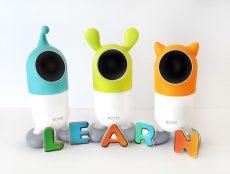
Articles
Industry News
K-12
Edwin and MyBuddy.AI Merge to Manufacture a Smart English Tutoring App
By Henry Kronk
March 03, 2020
Two edtech developers announced plans to join forces on March 2 in order to produce a new smart language-teaching robot companion for kids. Edwin has developed an English language learning platform that includes their own curriculum and tutoring from both human instructors and AI chatbots. MyBuddy.ai, meanwhile, developed an app system—Buddy the Robot—that includes voice-recognition capabilities. The resulting company will be known as MyBuddy.ai and base operations out of San Francisco.
Together, the formerly separate companies plan to combine their technology into a revamped Buddy the Robot. The new app will be able to teach English to kids around the world while also helping them practice speaking without the need for a more costly human tutor.
Edwin and MyBuddy.AI Join Forces
“Before the merger, it was like we were building two parts of one solution: Buddy — the voice-based educational game, and Edwin — the adaptive learning technology and EFL curriculum,” said Dmitry Stavisky, co-founder of Edwin, in a statement. “Together, we’ll be able to offer a unique solution for this important educational problem and build a sustainable business in this multi-billion dollar market.” Stavisky will serve as the COO of the new company.
Edwin participated in Y-Combinator’s accelerator program in 2018. After graduating, the company earned seed funding from Google’s Voice Assistant Investment Fund and General Catalyst.
Their product has been used by over 800,000 learners in Latin America, Japan, and Korea.
MyBudd.ai, meanwhile, was founded in 2017 and has earned just under $1 million in seed funding. The company currently counts 17,000 paying subscribers and says they’re growing at a rate of 20% per month.
“We all have personal stories that motivate us,” said MyBuddy.ai CEO and co-founder Ivan Crewkov, in a statement. “My daughter had to learn to speak English when I brought her to the U.S. when she was 3 years old. Through her struggle, I understood the scale of the problem. Now, she’s in the first grade and still plays and learns with Buddy.”
Applications of Personalized Language Learning Differ Widely Around the World
Few companies have applied speech recognition and AI-powered personalized learning technology to English language learning in the U.S. Few, furthermore, target markets like Latin America.
But similar app systems have taken off in China. Multiple companies have won venture funding and gained millions of users teaching languages with AI bots.
Liulishuo, a subsidiary of LAIX Inc., said they had 80 million users when the company went public in 2018. In total, they have raised nearly $130 million in venture funding.
Squirrel AI Learning has the support of Tom Mitchell, the former Dean of the School of Computer Science at Carnegie Mellon, who works for the company as Chief AI Officer. Besides developing their personalized learning system, they have also opened 1,700 brick-and-mortar learning centers in China.
In short, while developers in many regions of the world remain hesitant about AI personalized language learning, companies in China have developed the technology and deployed it to millions of learners.
But that may be changing in the U.S. Companies like Roybi have been gaining steam in the past year. Instead of using a computer or mobile device, the company makes the Roybi Robot. Besides getting recognized by Time as one of the best inventions of 2019, the company acquired a kid-focused AI speech recognition platform, KidSense.AI, in February.
Featured Image: Igor Starkov, Unsplash.









No Comments